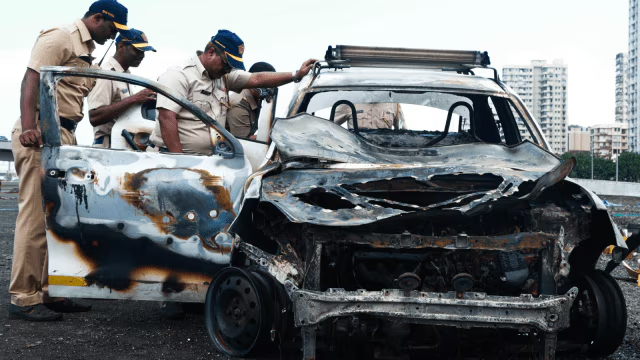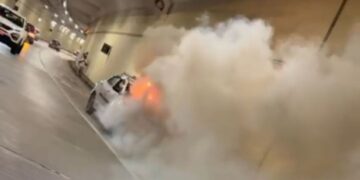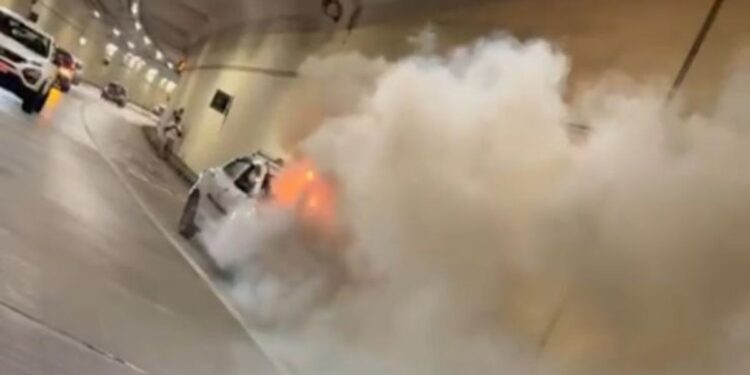A car burst into flames inside the southbound tunnel of Mumbai’s Coastal Road near Tardeo, bringing traffic to a standstill for nearly an hour. No casualties reported, as firefighters extinguish blaze and vehicles are diverted via Haji Ali and Worli Connector.

Car Catches Fire Inside Mumbai Coastal Road Tunnel; Traffic Paralyzed for an Hour
Incident Overview and Timeline
On Thursday morning around 9:30 AM IST, a car ignited inside the southbound tunnel of Mumbai’s Coastal Road near the Tardeo stretch, prompting an immediate shutdown of both northbound and southbound traffic.
The Mumbai Traffic Police posted on X (formerly Twitter):
“Traffic movement is stopped at Coastal Road (Tardeo) southbound and northbound due to car fire.”
Fire and rescue teams were dispatched promptly, entering the tunnel from the Breach Candy side after sealing off alternate access to ensure safety.
After roughly one hour of firefighting and smoke clearance, the blaze was extinguished and traffic movement gradually resumed, though residual congestion persisted for some time.
Impact on Traffic and Commuters
The sudden tunnel closure led to severe jams across adjoining roads, especially on the approaches to the Coastal Road. Many commuters were stuck inside or forced to turn back.
Traffic was diverted at Haji Ali and via the Worli Connector to manage flow while the tunnel remained closed.
Social media users shared images and videos of thick smoke inside the tunnel, vehicles halted mid-passage, and long queues forming on feeder roads.
Cause, Casualties, and Safety Measures
As of now, authorities have not reported any casualties or injuries related to the incident.
The precise cause of the fire is under investigation. The vehicle involved appears to have been engulfed rapidly—videos show flames emerging from the engine area, followed by dense smoke emission.
The Coastal Road tunnel is equipped with a Saccardo ventilation system and fire protection lining, intended to manage smoke dispersion and protect structural integrity during emergencies. Wikipedia
City planners and civic bodies may now revisit emergency readiness and response protocols for such high-impact infrastructure, especially given that a fire in a confined tunnel environment can quickly escalate.
Lessons and Broader Implications
- Emergency Response Readiness
The incident highlights the critical importance of well-planned emergency exit routes, fire suppression systems, and quick access for rescue teams in tunnel infrastructure. - Safety Audits and Maintenance
Regular inspection of vehicles entering tunnels, along with periodic safety drills, can help detect mechanical or electrical faults early. Ensuring fire detection systems and alarms are fully operational is vital. - Traffic Diversion Planning
Alternative routes like Haji Ali and the Worli Connector played a key role in redirecting traffic. Proper signage and pre-warning systems at tunnel entry points could reduce surprises to motorists. - Public Communication & Alerts
During the incident, traffic police used social media to issue advisories. Expanding real-time alert systems (SMS, radio, in-car systems) would help motorists plan alternate routes sooner. - Future Infrastructure Safety
With the Coastal Road tunnels being among India’s first undersea tunnels, long-term protocols for fire safety, ventilation, and structural health monitoring will be under focus. Wikipedia
The car fire inside the Coastal Road tunnel brought a major arterial route in Mumbai to a halt, disrupting traffic for about an hour. Fortunately, there were no casualties, and emergency services managed to restore normalcy. Yet, the event serves as a wake-up call for stricter safety protocols and enhanced preparedness in urban tunnel systems. As Mumbai continues to develop infrastructure that includes tunnels, underpasses, and expressways, such incidents will test the resilience and readiness of civic and emergency agencies.
READ ALSO…..How a 10-Year-Old in Worli, with Photographic Memory, Prevented a Disaster















 Categories
Categories









